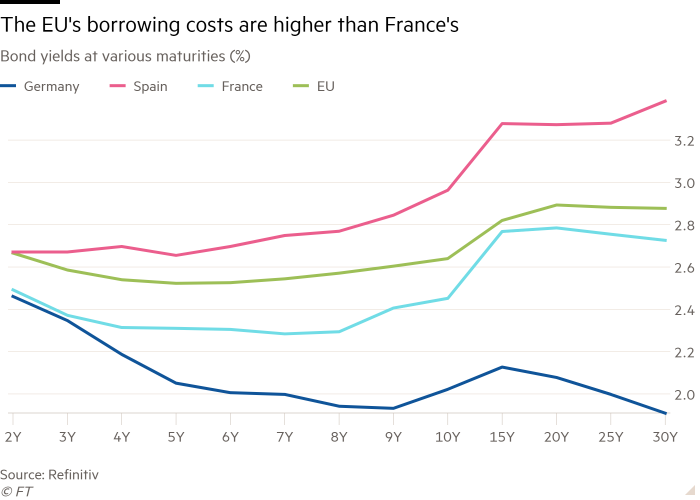Good morning. This article is an on-site version of our FirstFT newsletter. Sign up to our Asia, Europe/Africa or Americas edition to get it sent straight to your inbox every weekday morning
Economic officials from several US states have stepped up efforts to lure European clean energy businesses across the Atlantic, touting deep tax breaks available to foreign developers despite a bitter backlash from EU leaders.
Delegations from Michigan, Georgia, Ohio and other states have toured Europe armed with details of juicy subsidies offered by the Inflation Reduction Act, the administration of President Joe Biden’s landmark climate legislation passed in August.
“I don’t think we’ve actively recruited companies as intensely as we are now,” said Justin Kocher, director of international business for JobsOhio. Ohio officials met clean tech companies in Germany, Italy and Belgium in the past four months.
The IRA would pump $370bn worth of subsidies into clean energy, marking America’s most ambitious effort to tackle climate change, but has triggered furious criticism in Brussels and allegations that the US is discriminating against EU companies.
Valdis Dombrovskis, Europe’s trade commissioner, said last week that the fight against climate change should be done by “building transatlantic value chains, not breaking them apart”.
Five more stories in the news
Sunak on Zahawi’s tax affairs: ‘Questions need answering’ The UK’s Conservative party chair Nadhim Zahawi was fighting for his political life yesterday after Prime Minister Rishi Sunak ordered an ethics inquiry into his tax affairs, declaring that “there are questions that need answering”.
-
The FT View: Just what, international observers may be forgiven for asking, is going on in Britain — a country that once prided itself on the quality of its governance?
-
Labour vows to ‘rebuild’: Speaking to the Financial Times ahead of a speech to set out his foreign policy thinking on Tuesday, shadow foreign secretary David Lammy was scathing about the Conservatives’ legacy.
FTSE 100 companies’ staff suffer real-terms pay cuts FTSE 100 companies handed their staff average pay increases of about 6 per cent last year, failing to match the surge in inflation, according to an analysis into how the UK’s largest businesses have helped employees through the cost of living crisis.
EU debt in competition with sovereign borrowers The EU is paying more to borrow with its joint bonds than the bloc’s leading members. During the global bond sell-off of the past year, the EU’s borrowing costs rose more swiftly than those of many countries so that today they are higher than those of France, despite the EU’s triple-A credit rating outshining the double-A status of Paris.

German reluctance over tanks ‘threatens arms sales’ Berlin’s reluctance to approve re-exports of German-made tanks to Ukraine is damaging trust in the country’s defence sector, prompting warnings from Polish, Slovak and industry officials that future purchases and military co-operation are at risk.
Norwegian control over Arctic archipelago tested In a case starting today, Norway’s supreme court will assess whether a Latvian trawler needs a Norwegian licence to fish for snow crab in an extended area around the Arctic archipelago of Svalbard. The case will test Oslo’s interpretation of territorial waters and control of the region’s resources.
The day ahead
Inflation data S&P Global purchasing managers’ indices for manufacturing and services will be released for the eurozone, France, Germany, the UK and the US.
Corporate earnings In a big day for earnings, Associated British Foods, Canadian National Railway, Capital One Financial, General Electric, Halliburton, Invesco, Johnson & Johnson, Lockheed Martin, Microsoft, Raytheon Technologies, Saga and Verizon Communications are among the companies set to report results.
Doomsday clock update The non-profit Bulletin of the Atomic Scientists will announce the location of the minute hand on its Doomsday Clock, indicating the perceived likelihood of nuclear catastrophe.
To coincide with the publication of Martin Wolf’s new book, ‘The Crisis of Democratic Capitalism’, join him and other thought leaders online for a subscriber-exclusive event on January 31. Register for free here.
What else we’re reading
UK losing chance to become life sciences superpower The UK has everything it needs to be a 21st-century leader in precision medicine, writes Kate Bingham, managing partner at SV Health Investors, but short-term pressures are crowding out long-term solutions, squandering an important opportunity.

Wagner Inc: a Russian warlord and his lawyers As founder of the private mercenary operation known as the Wagner Group, which offers muscle to dictators and has waged war in the Middle East and Africa as an unofficial foreign policy tool of the Kremlin, Russian entrepreneur Yevgeny Prigozhin is one of the most sanctioned individuals on the planet. An FT investigation shows how he has used leading corporate lawyers around the world to try to keep western governments at bay.
The rise of Esther Crawford in Musk’s ‘hardcore’ Twitter The social media giant’s director of product management has become one of the few women at the company to join Elon Musk’s trusted lieutenants. Some insiders believe the 39-year-old has the charismatic energy needed to transform Twitter’s flailing business, while also having the ear of its impulsive owner. Others revile her as a sycophant and opportunist.
What to do if you hate your job Whatever your reason for being unhappy at work, hating your job is not viable long term. Grace Lordan of the London School of Economics shares eight proactive strategies to identify the source of the problem — and to do something about it.
Could ‘revenge spending’ in China signal global recovery? Chinese households are sitting atop the biggest pool of new savings in history, accumulating $2.6tn of bank deposits last year alone as strict anti-coronavirus policies crushed consumer spending. The anticipation of a tsunami of pent-up demand is now underpinning hopes for a global economic recovery.
Take a break from the news
Eleven across is simply “nonsense, twaddle”, while the down clues are more cryptic. Try your hand at the FT’s latest crossword puzzle.
Thank you for reading and remember you can add FirstFT to myFT. You can also elect to receive a FirstFT push notification every morning on the app. Send your recommendations and feedback to firstft@ft.com






